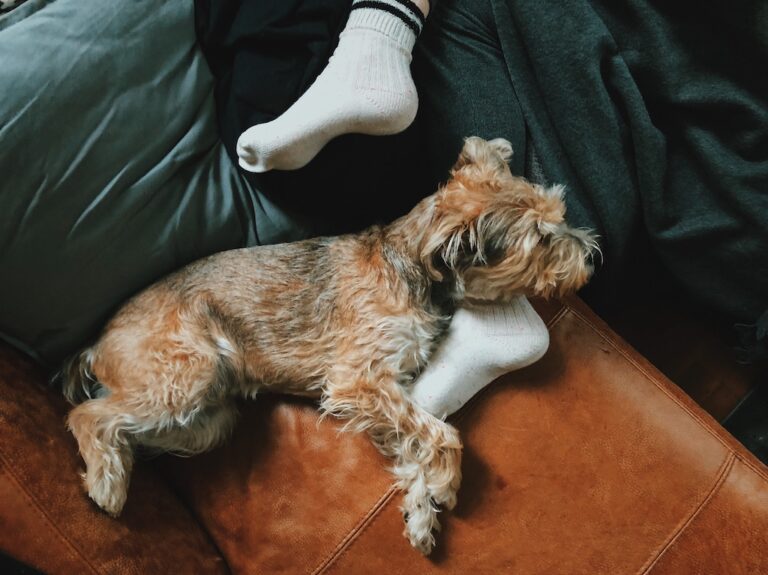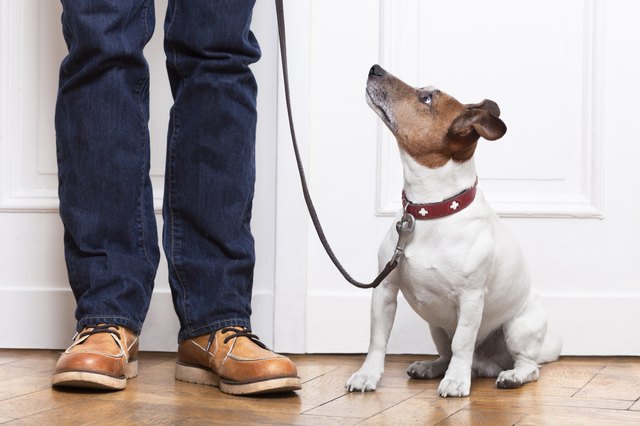Have you ever caught your dog doing a little “scoot” across the floor, dragging their rear end with a mischievous grin? It’s a common sight, and one that can leave you scratching your head, wondering what’s going on. It’s not always a sign of something serious, but it can also be a symptom of an underlying problem. This peculiar behaviour is usually caused by anal gland issues, but there are other reasons why your dog might be indulging in this rather unsavory practice. This article will dive into the various causes, offering insights to help you understand and address the issue.

Image: tails.com
My own dog, a scruffy terrier mix named Buddy, has a particular penchant for butt scooting, especially after a delicious meal. While initially amusing, I quickly learned that it was often a sign of discomfort and not just a quirky habit. Through observation, research, and consultations with my vet, I’ve learned a lot about the world of anal glands and the reasons behind this peculiar canine behaviour. Let’s explore this phenomenon together.
Understanding the Anal Glands
What are Anal Glands?
Anal glands, also known as scent glands, are small, pea-sized sacs located on either side of the anus. They secrete a pungent-smelling fluid that serves a unique purpose in the canine world. This fluid has a distinctive musky odor that helps dogs communicate with each other, marking their territory, and even attracting mates. It’s a part of their natural scent language. While the fluid is usually released in small amounts during defecation, sometimes it can become impacted or infected, leading to the infamous butt scooting behaviour.
When the anal glands are full, they can become painful, leading to discomfort and a strong urge for dogs to rub their bottoms on the floor, trying to relieve the pressure. This is often accompanied by other symptoms like excessive licking of the rear end, pawing at the anus, and even a noticeable odor.
Reasons Why Your Dog Might be Rubbing His Butt on the Floor

Image: www.cuteness.com
1. Impacted Anal Glands:
The most common reason for butt scooting is impacted anal glands. This occurs when the glands become filled with a thick, waxy secretion that can’t be expelled normally. This buildup can cause pain, inflammation, and discomfort. Dogs with impacted anal glands might also have a strong odor or have difficulty defecating.
2. Infected Anal Glands:
If the impacted anal glands are not addressed, they can become infected, leading to redness, swelling, and pus discharge. This can be painful for your dog and require veterinary intervention.
3. Allergies:
Certain allergies can cause irritation and itching in the anal area, making your dog more prone to rubbing their butt on the floor. These allergies can be triggered by food, environment, or even parasites.
4. Parasites:
Some parasites like roundworms or tapeworms can live in your dog’s intestinal tract and cause irritation and itching around the anus. These parasites can also cause other symptoms like diarrhea and weight loss, making it important to address them through deworming.
5. Irritations:
Simple irritations like skin tags, anal polyps, or even a foreign object lodged in the anal area can cause itchiness and the urge to scoot. These irritations are often noticed during a vet visit, and your vet can use a cotton swab to carefully remove any foreign objects or gently express the anal glands.
6. Medical Conditions:
While less common, some medical conditions like inflammatory bowel disease or tumors can also cause itching and the desire to scoot. These conditions are often accompanied by other symptoms like diarrhea, vomiting, or weight loss, and it’s important to consult with your vet.
What to Do When Your Dog Scoots
If you notice your dog scooting, it’s important to observe their behaviour and monitor for other symptoms. Some scooting is normal, particularly after defecating, but excessive or persistent scooting requires attention. Here are some steps you can take:
1. Monitor for Other Symptoms:
Pay close attention to your dog’s behaviour. Do they seem uncomfortable, lick their rear end excessively, or have trouble defecating? Are there any noticeable changes in their appetite, energy levels, or bowel movements? These symptoms can point toward a more serious issue and should be discussed with your veterinarian.
2. Consult Your Veterinarian:
It’s always best to seek advice from your veterinarian if you have concerns about your dog’s behaviour. They can examine your dog, perform necessary tests, and diagnose the cause of the scooting. This will help determine the best course of treatment for your dog’s specific needs.
3. Follow Your Veterinarian’s Instructions:
Once your vet has diagnosed the cause of the scooting, follow their instructions carefully. This might include medication, dietary changes, anal gland expression, or a combination of treatments. Remember, consistency is key to recovery, and following your vet’s guidance will help ensure the best outcome for your dog.
FAQ
Are anal glands only a problem in dogs? While anal glands are common in dogs and other animals, they can also be found in cats. However, issues with cat anal glands are less common.
Can I express my dog’s anal glands myself? While you might see videos online showing how to express anal glands, this is not recommended. Improper handling can cause pain, injury, and even infection. Leave this to your vet or a qualified groomer.
Is butt scooting contagious? Butt scooting itself isn’t contagious, but the underlying causes like parasites can be contagious if not properly addressed. Be sure to follow your vet’s advice on preventing the spread of parasites to other pets in your home.
Why Is My Dog Rubdomain_7 His Butt On The Floor
Conclusion
If your dog is rubbing their bottom on the floor, it’s important to understand the possible reasons for this behaviour. While anal gland issues are the most common cause, it’s also essential to rule out other underlying conditions. By observing your dog’s behaviour, monitoring for other symptoms, and consulting with your veterinarian, you can take the necessary steps to ensure your dog’s comfort and well-being. Remember, early intervention is key to resolving any problems and keeping your furry friend happy and healthy.
Are you interested in learning more about pet health and behaviour? Share your thoughts and questions in the comments below!



/GettyImages-173599369-58ad68f83df78c345b829dfc.jpg?w=740&resize=740,414&ssl=1)


